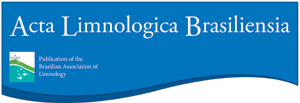Aim: This study was conducted to evaluate the effect of the detritus composition on the anaerobic mineralization of two species of aquatic macrophytes with different life forms (submerged and free floating). The hypothesis that guided this study was that the carbon concentration derived from detritus hydrosoluble fraction can act as a facilitating factor on its degradation.
Material and Methods
Incubations containing detritus and water sample from the Óleo Lagoon (21° 33’ to 21° 37’ S and 47° to 47° 45’ to 51’ W) for each specie (Salvinia auriculata and Utricularia breviscapa) were set-up with: (i) integral detritus (sample of dried plant), (ii) lignocellulosic matrix (particulate organic matter (POM) remaining from leachate extraction) and (iii) leachate. The incubations were kept in the dark under anaerobic conditions. Daily rates of gas formation were evaluated and after 138 days, the incubations were fractioned in dissolved and particulate fractions and the mass balances were performed. A mass loss experiment (180 days) was performed for assessment of the dissolved organic carbon, particulate organic carbon and mineralized carbon variations.
Results
Regardless of the type of detritus (S. auriculata and U. breviscapa), C-mineralization was faster and higher in the DOC incubations (ca. 85%). For U. breviscapa the POM mineralization was slower than the corresponding integral detritus and S. auriculata mineralization was slower than U. breviscapa.
Conclusions
The composition of the detritus (i.e. macrophyte type, presence and proportion of leachate) interfered synergistically in anaerobic degradation of these plants. The leachate tends to act as a facilitator, supporting the growth of microorganisms and intensifying mineralization.
decomposition; aquatic macrophytes; kinetic models; anaerobiosis; gas production

 Thumbnail
Thumbnail
 Thumbnail
Thumbnail

